Related Research Articles

Associated Television was the original name of the British broadcaster ATV, part of the Independent Television (ITV) network. It provided a service to London at weekends from 1955 to 1968, to the Midlands on weekdays from 1956 to 1968, and to the Midlands all week from 1968 to 1982. It was one of the "Big Four" until 1968, and the "Big Five" after 1968, that between them produced the majority of ITV networked programmes. In 1982, ATV was restructured and rebranded as Central Independent Television, under which name it continued to provide the service for the Midlands.
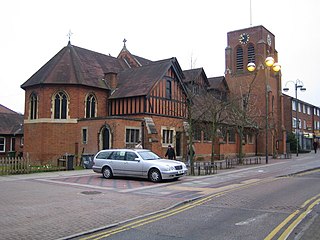
Borehamwood is a town in southern Hertfordshire, England, 13 miles (21 km) from Charing Cross. Borehamwood has a population of 36,322, and is within the London commuter belt. The town's film and TV studios are commonly known as Elstree Studios.
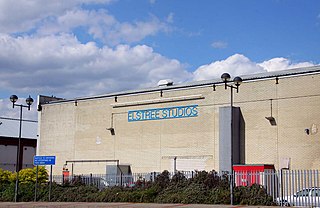
Elstree Studios is a generic term which can refer to several current and demolished British film studios and television studios based in or around the town of Borehamwood and village of Elstree in Hertfordshire, England. Production studios have been located in the area since 1914 when film production began there.
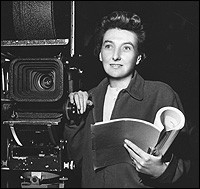
Violette Muriel Box, Baroness Gardiner, was an English screenwriter and director, Britain's most prolific female director, having directed 12 feature films and one featurette. Her screenplay for The Seventh Veil won an Academy Award for Best Original Screenplay.

Bray Film Studios is a British film and television facility in Water Oakley near Bray, Berkshire. It is best known for its association with Hammer Film Productions.
MGM-British was a subsidiary of Metro-Goldwyn-Mayer initially established at Denham Film Studios in 1936. It was in limbo during the Second World War; however, following the end of hostilities, a facility was acquired in Borehamwood, which remained in use until it was closed in 1970.

Associated British Picture Corporation (ABPC), originally British International Pictures (BIP), was a British film production, distribution and exhibition company active from 1927 until 1970 when it was absorbed into EMI. ABPC also owned approximately 500 cinemas in Britain by 1943, and in the 1950s and 60s owned a station on the ITV television network. The studio was partly owned by Warner Bros. from about 1940 until 1969; the American company also owned a stake in ABPC's distribution arm, Warner-Pathé, from 1958. It formed one half of a vertically integrated film industry duopoly in Britain with the Rank Organisation.
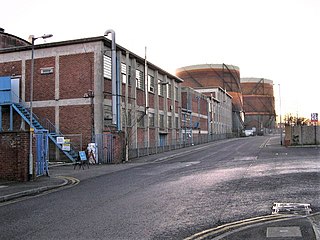
Gate Studios was one of the many studios known collectively as Elstree Studios in the town of Borehamwood, England. Opened in 1928, the studios were in use until the early 1950s. The studios had previously been known as Whitehall Studios, Consolidated Studios, J.H. Studios and M.P. Studios.
Joseph Grossman was a pioneer of the British film industry, most famous as the charismatic Studio Manager of Elstree Studios. Born in Dartford, Kent, the son of Myer Grossman and Rosa Morris, who belonged to Jewish families originally from Germany and Poland, he was always known as "Joe" and was famous for his nervous twitches and his Cockney humour. Joe Grossman was a contemporary of Oscar Deutsch and Michael Balcon, both of whom lived near his grandparents in Birmingham. He is mentioned in Michael Balcon's autobiography.
Walter Summers (1892–1973) was a British film director and screenwriter.

The BBC Elstree Centre, sometimes referred to as the BBC Elstree Studios, is a television production facility, currently owned by the BBC. The complex is located between Eldon Avenue and Clarendon Road in Borehamwood, Hertfordshire, England.
British Instructional Films was a British film production company which operated between 1919 and 1932. The company's name is often abbreviated to BIF.
Harry Bruce Woolfe CBE, was an English film producer and occasional director who founded British Instructional Films. The company focused on documentaries, nature films, and works concerning World War I. He was himself a veteran so had an interest in using film to re-enact the war. This links to his being referred to as an "ardent imperialist" who intended to tell heroic stories of said war. In addition to work on war films he initiated the Secrets of Nature series.
The Battles of Coronel and Falkland Islands is a 1927 British docudrama film directed by Walter Summers. The film focuses on the naval warfare around the Battle of Coronel and Battle of the Falkland Islands during the First World War. It was the last in a successful series of documentary reconstructions of First World War battles by British Instructional Films made between 1921 and 1927. The film was produced at Cricklewood Studios and on location off Malta and the Isles of Scilly. The film is an entirely fictional recreation with a strong documentary feel.
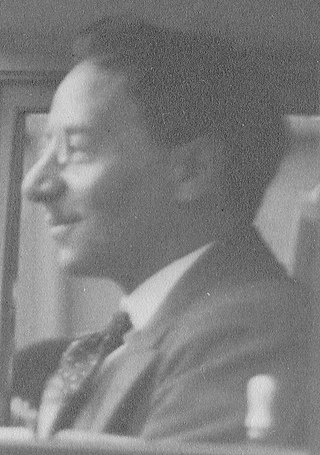
Ludwig Blattner was a German-born inventor, film producer, director and studio owner in the United Kingdom, and developer of one of the earliest magnetic sound recording devices.

Imperial Studios were the studios of the British and Dominions Film Corporation, a short-lived British film production company located at Imperial Place, Elstree Way, Borehamwood, Hertfordshire. The studios were active from 1929 to 1936, when they were destroyed by fire.
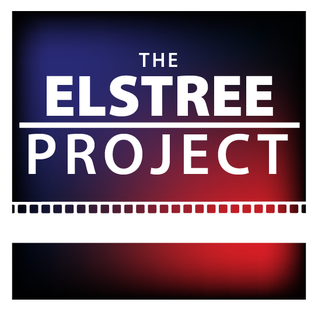
The Elstree Project is an oral history project which began in 2010, interviewing cast and crew members who worked at Elstree Studios. The project is conducted in partnership Howard Berry, a Senior Lecturer at the University of Hertfordshire, and formerly involved Elstree Screen Heritage as a partner. The project is endorsed by the BECTU History Project and Elstree Film Studios.
Surbiton Studios were a British film studio located in Surbiton, then on the outskirts of London. The studio was one of several opened during the boom in British production following the First World War. It was opened in 1918 and its first film was released in January 1919. Its owners were Stoll Pictures which became one of the largest British film company of the early 1920s.
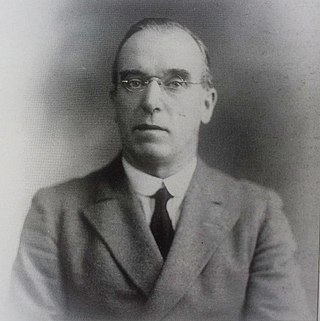
John Maxwell (1879–1940) was a British film producer. Maxwell was the co-owner of British International Pictures, which emerged as the largest British studio following the Film Act of 1927. Maxwell was a Scottish lawyer who first came into contact with the film industry in 1912. In 1927 he took over the newly constructed British National Studios in Elstree after its founders ran into financial problems. Maxwell built a vertically integrated company incorporating film production, film distribution, initially through Wardour Films, and a large network of cinemas that enabled the company to compete with the leading German and Hollywood firms. Along with the facilities in Elstree, the company also acquired Welwyn Studios in Welwyn Garden City.

Elstree Studios on Shenley Road, Borehamwood, Hertfordshire is a British film and television production centre operated by Elstree Film Studios Limited. One of several facilities historically referred to as Elstree Studios, the Shenley Road studios originally opened in 1925.
References
- 1 2 Warren, Patricia (2001). British Film Studios: An Illustrated History. B. T,. Batsford. p. 180–82.
- ↑ Burton, Alan; Chibnall, Steve (2013). Historical Dictionary of British Cinema. Lanham, MD and Plymouth, England: Scarecrow Press. p. 43. ISBN 9780810880269.
- ↑ Picturegoer , October 21, 1950 pp.8-9